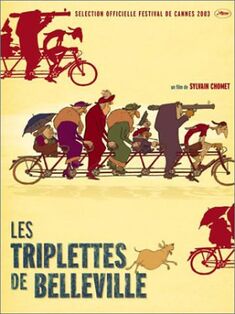
The Triplets of Belleville (Template:Lang-fr) is a 2003 animated comedy film written and directed by Sylvain Chomet. It was released as Belleville Rendez-vous in the United Kingdom. The film is Chomet's first feature film and was an international co-production among companies in France, the United Kingdom, Belgium, and Canada.
The film features the voices of Michèle Caucheteux, Jean-Claude Donda, Michel Robin, and Monica Viegas; there is little dialogue, the majority of the film story being told through song and pantomime. It tells the story of Madame Souza, an elderly woman who goes on a quest to rescue her grandson Champion, a Tour de France cyclist, who has been kidnapped by the French mafia for gambling purposes and taken to the city of Belleville. She is joined by the Triplets of Belleville, music hall singers from the 1930s, whom she meets in the city, and her obese hound, Bruno.
The film was highly praised by audiences and critics for its unique style of animation. The film was nominated for two Academy Awards — Best Animated Feature and Best Original Song for "Belleville Rendez-vous". It was also screened out of competition (hors concours) at the 2003 Cannes Film Festival.[1]
Plot[]
The story focuses on Madame Souza, an elderly woman raising her young grandson, Champion. Souza notices her grandson is sad and lonely, hinted as due to the loss of his parents, so she first tries to get him interested in the piano. When this fails, she buys him a puppy named Bruno to cheer him up. Although he is initially happy, he quickly becomes melancholy once again. After discovering that Champion has a keen interest in road bicycle racing, because it is implied that Champion's deceased parents were bicyclists, she buys him a tricycle. Years later, Champion becomes a professional cyclist with Souza as his coach.
Eventually, Champion enters the Tour de France but during the race, he and two other riders are kidnapped by two French mafia henchmen and brought to the bustling metropolis of Belleville.
Souza and Bruno follow the men, but lose their trail soon after reaching the city. Lost and with no way to find Champion, Souza has a chance encounter with the renowned Belleville triplets, music hall singers from the 1930s, now elderly women turned improvisational musicians. The sisters take Souza to their home and over time she becomes a part of their group. Meanwhile, the mafia boss drugs the kidnapped cyclists and employs a mechanic to build a stationary cycling machine for the racers to race on — to create their own mini Tour de France for gambling.
At a fancy restaurant, the Triplets and Souza perform a jam session using a newspaper, refrigerator, vacuum and bicycle wheel as instruments. The mafia boss who kidnapped her grandson happens to be in the same restaurant and, with the help of Bruno, Souza realizes he has Champion. She tails one of the Mafia's minions the next day and discovers their scheme. That night, several mob bosses and their henchmen arrive at the mafia hideout and place bets on the riders (one of whom falls off his bicycle from exhaustion, at which point the bookmaker shoots him as one would an injured horse). Madame Souza, Bruno and the triplets then infiltrate the hideout and sabotage the contraption, unbolting it from the ground and turning it into a pedal-powered vehicle on which they all escape. The mob henchmen pursue them, but are all thwarted amidst the chase. The film ends with the motley group riding on out of Belleville, and a flashforward to an elderly Champion reflecting on the adventure, as told to him by the then deceased Souza.
Reception[]
Rotten Tomatoes, a review aggregator, reports that 94% of 140 surveyed critics gave it a positive review, and the average rating was 8.2/10; the consensus reads: ""Richly detailed and loaded with surreal touches, The Triplets of Belleville is an odd, delightful charmer."[2] Metacritic, which assigns a normalized score, rated it 91/100 based on 36 reviews.[3]
Awards[]
The film was nominated for two Academy Awards: for Best Animated Feature, making it the first PG-13 animated film to be nominated in that category; and for Best Original Song (Benoît Charest and Sylvain Chomet for the song "Belleville Rendez-vous", sung by Matthieu Chedid in the original version). The film lost the Best Animated Feature award to Finding Nemo. It also has won the César for Best Film Music,[4] and as a co-production with Canada it won the Genie Award for Best Motion Picture[5] and the BBC Four World Cinema Award in 2004.[6]
